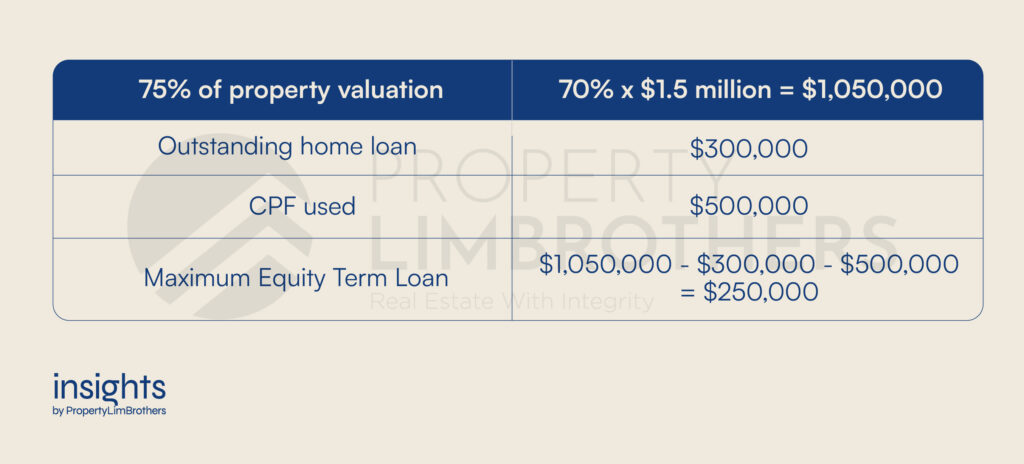
Those familiar with Equity Term Loans often regard it as the “key” to “unlocking” the value of your property.
What is an Equity Term Loan
Equity Term Loans are a type of home mortgage loan whereby you utilise the equity of your property as collateral after buying and accumulating equity in your property.
Accumulating equity in your property refers to when the property appreciates in price over time.
How does an Equity Term Loan exactly work?
All mortgage loan rules still apply, so for example…
You had previously purchased a property in 2020 for $1 Million, which is now valued at $1.5 million. You can then proceed to take an equity term loan of up to 75% of the appreciated portion (to maintain the minimum Loan-to-Value (LTV) ratio of 25%), minus the amount used for CPF in the purchase of the property.
Continuing with the example
If you were to have an outstanding loan of $300,000. And you have also used about $500,000 of your CPF to pay for this property so far…

Who is eligible to take an Equity Term Loan?

To take an equity term loan in Singapore, one must be an owner of a private property, so sorry to the folks that only own an HDB, but you will not be eligible (but you can keep this in mind after upgrading to a private property!).
Owners of Executive Condominiums have to reach their Minimum Occupation Period of 5 years before being eligible.
And if you still have outstanding payments on their mortgage loan, you can only get the equity term loan from the same bank.
For example, if you had previously signed a home loan with DBS, you can only take a DBS equity term loan. Or explore the option when refinancing your loan with another bank.
Can I use a home equity loan to buy more properties?
Home equity loans are not allowed to be used in purchasing another property. However, how others have been “skirting” around this is to utilise the extra capital in investing in capital markets (stocks) or in other property investments we will share below!
For more information about the surrounding laws and regulations on taking and utilising an Equity Term, head to the Monetary Authority of Singapore website, which details the rules and regulations in depth.
So what are some of the ways I can use the equity term loan?
1. Renovation
Beside making your home your sanctuary of rest, it could actually raise the home’s perceived valuation, and draw greater interest from potential buyers. With the hoard of listings on property portals, a nicely renovated home will be sure to stand out when you choose to sell it later on.
2. Funding Education Cost / Wedding Cost / Business Expenses
While it might not make sense to utilise a home equity loan to fund local university cost as our local banks offer “interest-free” loans during the course of study.
However such a deal is not available for Singaporeans leaving for overseas university, and with interest rates for overseas study loans hovering above 4%, it might be more fiscally wise to utilise a home equity loan to fund the education cost.
Likewise in other instances where loan rates maybe higher such as business loans, and wedding loans, the same strategy can be utilised to get a cheaper loan.
3. Consolidation of Debt
Your home equity loan can also be strategise your debt repayment by consolidating higher interest debt at a lower interest rate.
However, you should consider that by doing so, you are turning your unsecured debt into secured debt, backed by your home which acts as collateral should you default on your payments.
What are the interest rates for an Equity Term Loan now?
With the ever-increasing interest rates and headlining news such as Singapore home loan rates hitting a new high of 3.08%, everyone might wonder how the interest rate for an equity term loan would be any different.
Banks consider home equity term loans as home loans. Hence, the interest rate comes in a fixed or floating rate format, just like home loans.
While currently, it may not be the most ideal situation to take an equity term loan now as compared to the previous interest rate environment, when home loan rates hopefully return back to the glorious 1-2% range, this could aid in your overall investment strategy by increasing your capital available for deployment.
Low-interest rates of equity term loans come at a cost!
There are high ramifications for not repaying the loan. Missing repayments may give the bank an opportunity to initiate foreclosure, whereby they have the right to possess your property and auction it to recover their loss.
Thus it might be wise to only take such a loan on your second property or a fully paid-off property.
In this way, you do not run the risk of foreclosure, or losing the roof over your head. Taking an equity term loan on a fully paid property also provides you with more options as you would be free to choose which bank you would like to take an equity term loan with, giving you the ability to select a most beneficial plan for your situation.
Special Home Equity Term Loans: DBS Home Equity Income Loan
This collaboration between the CPF Board and DBS is made available to Singapore Citizens and PRs aged 65 to 79, who only own one fully paid off property with a remain lease of at least 30 years
Money borrowed through the loan will be through monthly payments from CPF instead of in cash like usual home equity loans.
DBS Home Equity Income Loan Review: CPF Scheme for Private Property Owners – MoneySmart.sg
DBS Home Equity Income Loan | DBS Singapore
Other Caveats of using an Equity Term Loan
Cost of taking an equity term loan
In order to take an equity term loan, homeowners would have to get their property revalued
There will also be legal and administrative fees associated with applying for an equity term loan. All these property valuations, and legal and administrative fees could add up to about $6,000.
Time taken to get an equity term loan
Equity term loans take about 2 to 4 months to be approved, depending on your bank’s procedures.
Using CPF to pay an equity term loan
CPF cannot be utilised in servicing an equity term loan.
Do Your Due Diligence!
While the equity term loan can be a rather powerful form of leverage in your property investment journey. It is always best to assess before jumping the gun on taking one!
Leveraging yourself holds a certain level of risk. When considering if such methods fit your grandiose retirement plans, measure your risk appetite.
If you’re still unsure if such a financing method is the right one for you, or need more guidance on planning your real estate investment plans? Feel free to reach out to our team!








